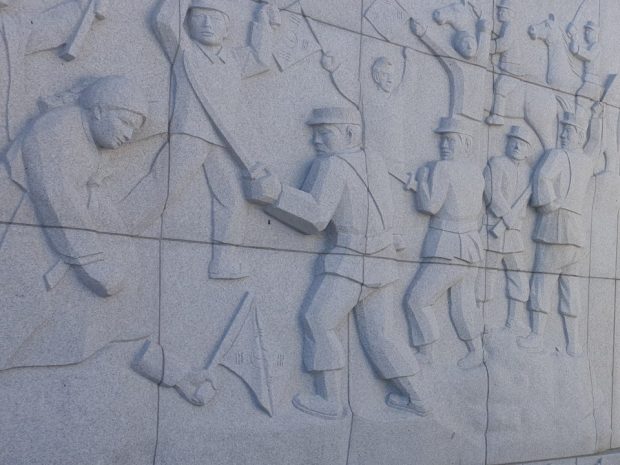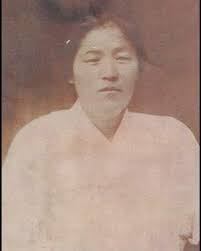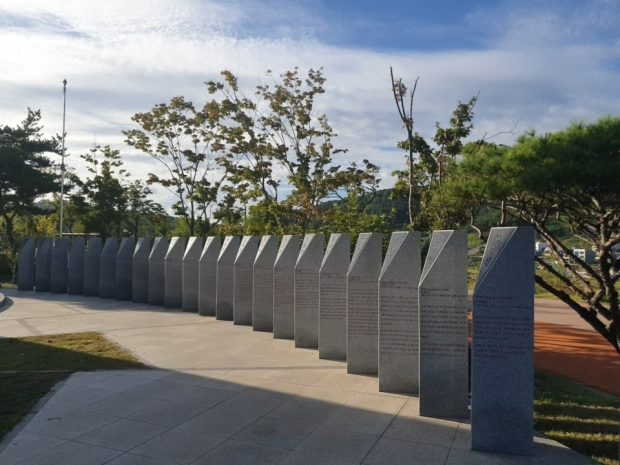
South Korea Independence Day: Do you know Yoon Hyung Sook?

By Sang-ki Lee
AsiaN Reporter, Former Chairman of Korea Journalists Association
Yeosu: The name ‘Yeosu’ recalls both the 2012 Yeosu Expo and the Yeosu-Suncheon rebellion of 1948. The two incidents with the interval of approximately 60 years symbolically represent the present and the past of Korea. Yet, there is another major figure that stands as a powerful icon in Yeosu – Admiral Yi Sun Shin.
Oddly enough, it is not widely known that Admiral Yi Sun Shin made outstanding achievements of confronting the Japanese invasion force while he was in the headquarters at Yeosu. It is a distinct fact that Admiral Yi kept his mother Byeon and his wife Bang at Ungcheon, Yeosu in Song-hyeon village. The indication of the residence of Admiral Yi’s mother remains at the place.
Perhaps from the influence of Admiral Yi’s dedication towards the country, Yeosu raised multiple eminent independence activists 400 years after his death, including the activists in the resistance against the Japanese.

One of them is the independence activist Yoon Hyung Sook. Yoon who was attending Gwangju Speer Girls’ High School at the time led a crowd of nearly 1,000 people gathered for Manse Demonstrations and marched shouting “Long live Independence of Korea!” on March 10, 1919. Japanese soldiers ordered them to disperse, suppressing the non-complying crowd by firing blanks.
However, activist Yoon did not surrender and firmly continued the march. At that very moment, a Japanese soldier struck Yoon’s left arm with a military sword. Yoon who fell on the ground and was covered in blood stood up with the Korean flag on her hand and started to shout, “Long live Independence of Korea!” in a louder voice. Witnessing such righteous and praiseworthy action, the indignant crowd furiously continued the protest.
Yoon, with her left upper arm amputated and her right eyesight lost, was arrested and sentenced to four months in prison at the Japanese court in Gwangju; she was then confined for years at a facility presumed to be a military hospital for treatment of her injuries. Afterwards, she taught children with her disabled body and continued showing resistance towards Japanese through a campaign to abolish illiteracy. She also practiced missionary work as a Christian missionary but was arrested by the retreating army on September 9, 1950 during the Korean war and was executed with the reverend Son Yang Won at an Orchard in Mipyeong, Yeosu. She was 50.
In 2004, the Korean government honored Yoon Hyung Sook’s achievements and contribution to the independence movement by awarding her with the Order of Merit for National Foundation. Historical attention to Yoon Hyung Sook has been increasing not only from the national reward but also also from the name “Ryu Gwan Sun of the South.” Nevertheless, can it be said that those of us who are living in the prosperity and liberty with the sacrifice of the anti-Japanese activists are fully meeting our responsibilities?

Opportunely, with such reasons, Yeosu is holding an academic seminar and a memorial with the theme of ‘Remembering activist Yoon Hyung Sook’ to commemorate the centennial of March 1 Movement.
The event, organized and hosted by Yeosu Mayor Kwon Oh Bong and the association of the surviving families of Yeosu independence activists (President Oh Ryong) and sponsored by the Presidential Commission on Centennial Anniversary of March 1st Independence Movement and Korea Provisional Government (Chairman Lee Jong Chan) will be held on September 27 at Yeosu Culture Hall inside Yeosu City hall and the graveyard of Yoon Hyung Sook from 2 p.m. to 6 p.m.
For the first time, Yeosu is holding a seminar academically investigating a local independence activist. In the academic seminar, Gwangju University professor Han Gyu Mu and Kwangshin University professor Kim Ho Uk will each be presenting ‘life of the activist Yoon Hyung Sook and her resistance to Japanese’ and ‘Honam Christian missionary works during Japanese colonialism and resistance to Japanese of Yoon Hyung Sook.’
The debate will include Cheongam College professor Kim In Duk, chief director of Yeosu Community Research Institute.


